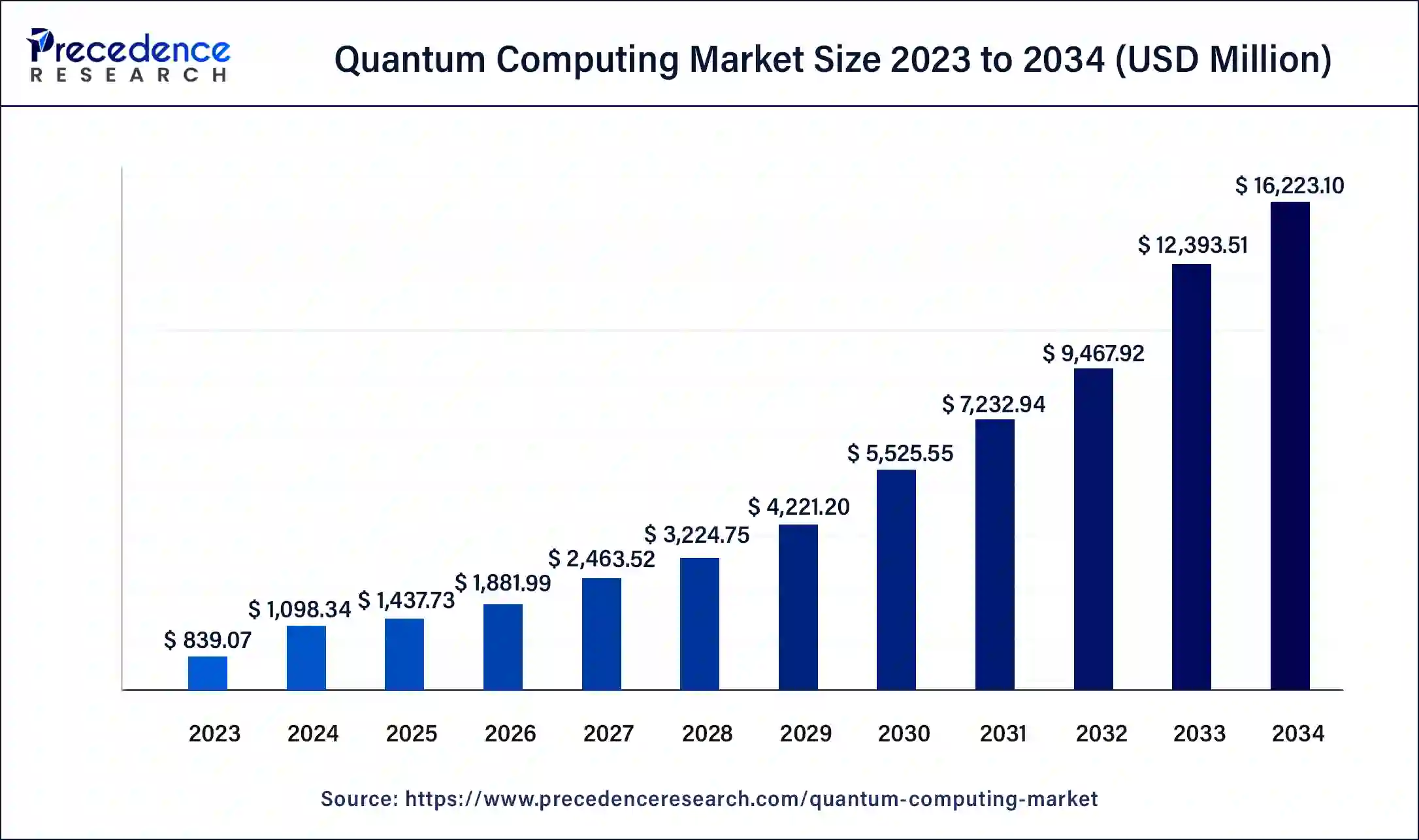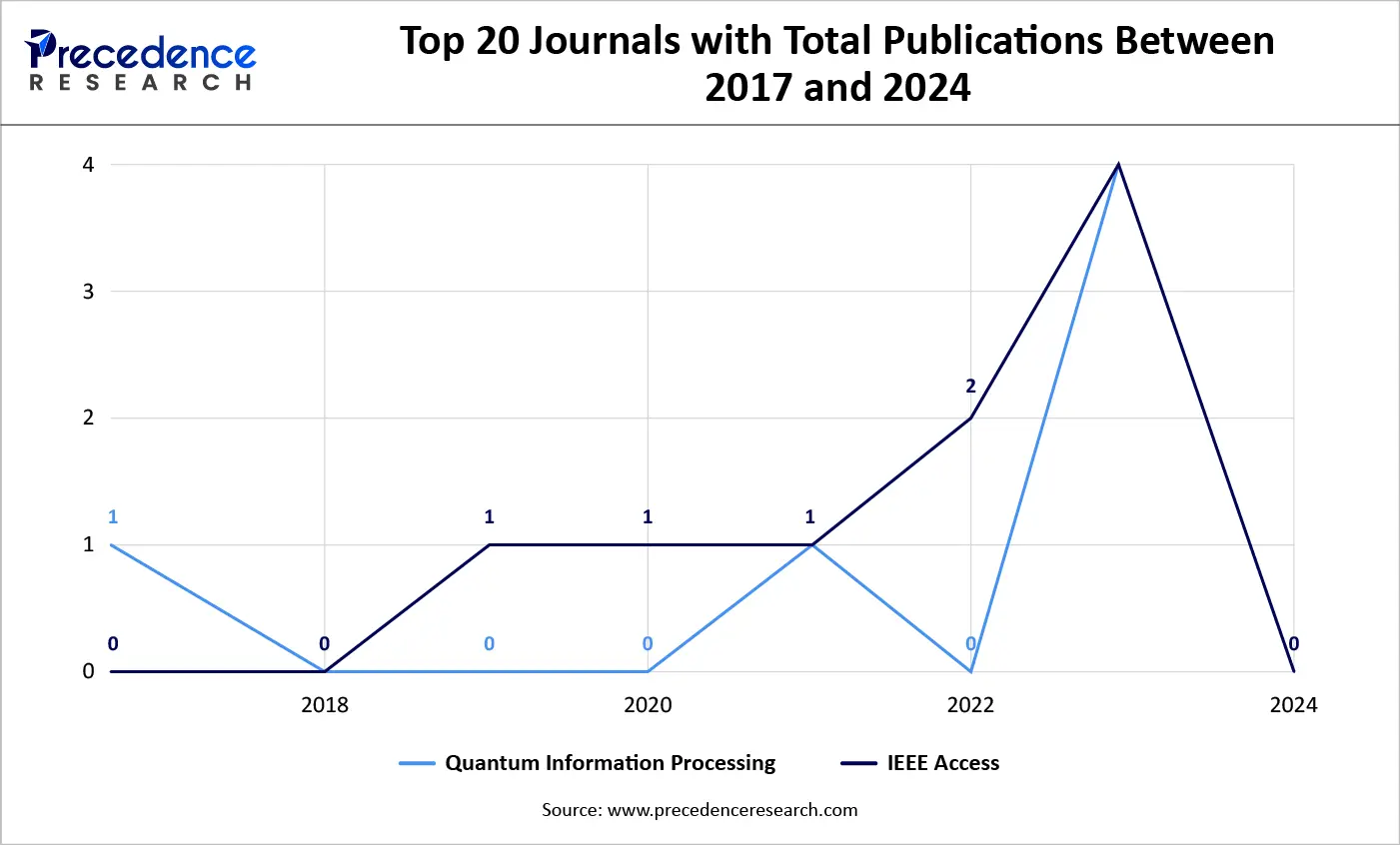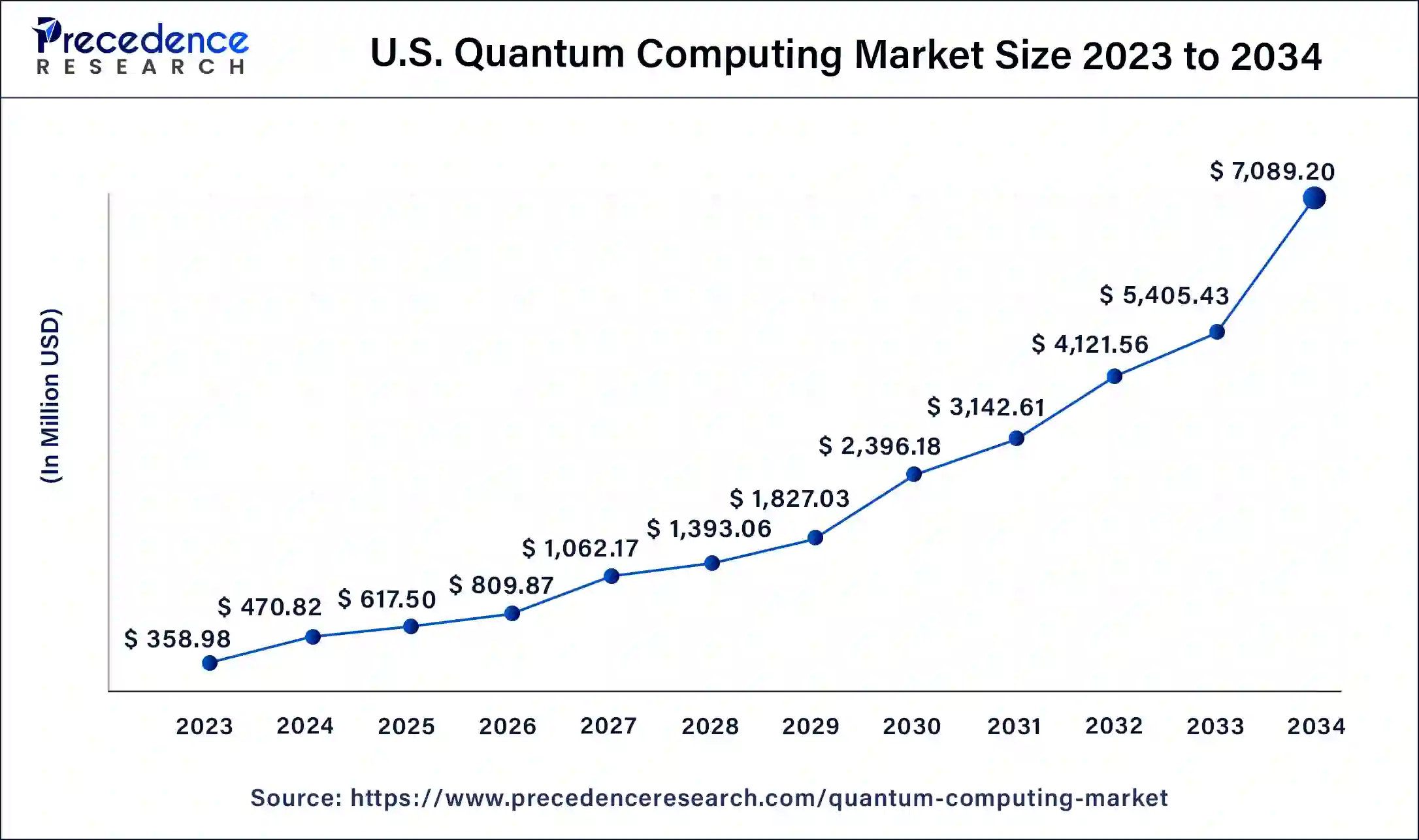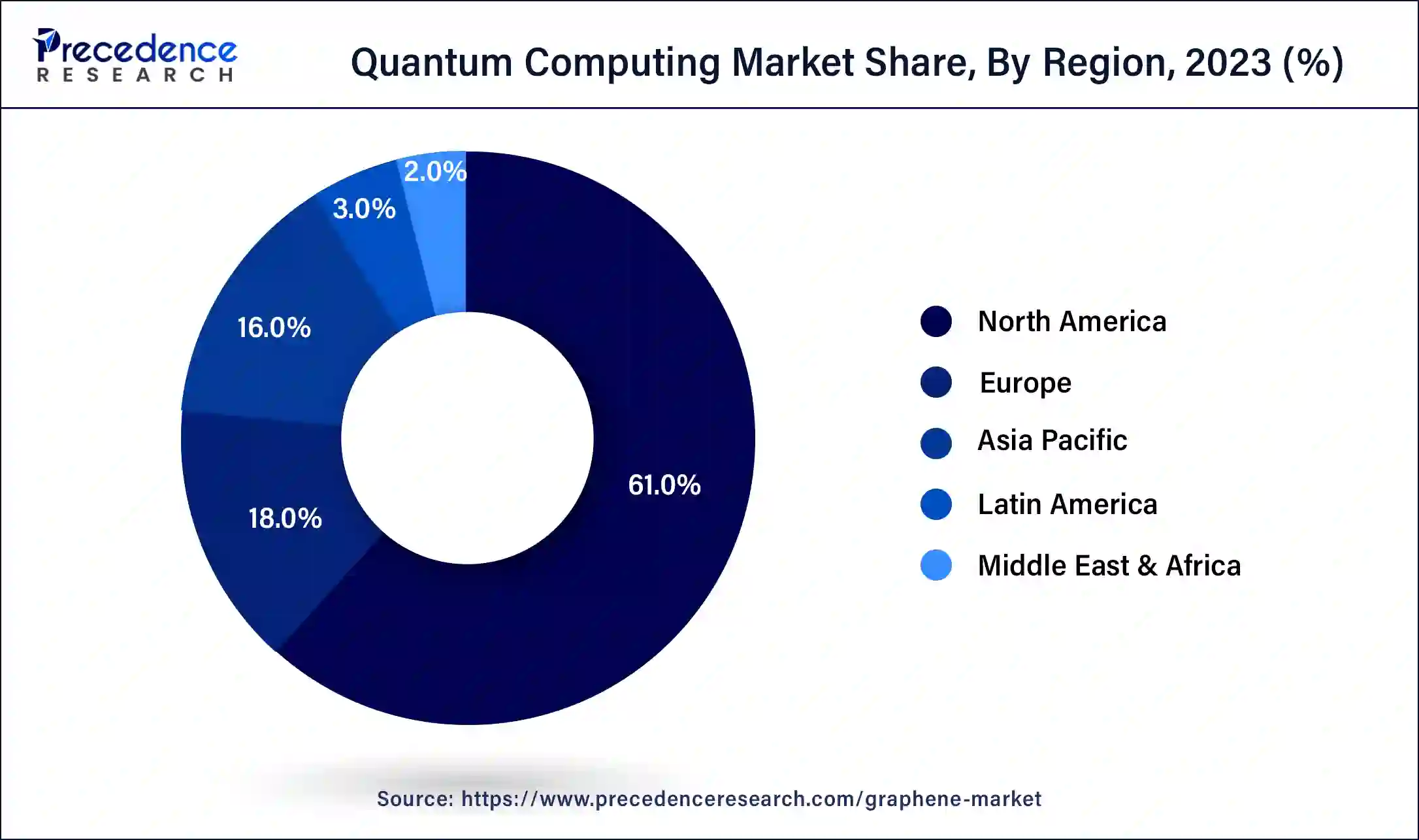What is the Quantum Computing Market Size?
The global quantum computing market size is valued at USD 1.44 billion in 2025 and is predicted to increase from USD 1.88 billion in 2026 to approximately USD 19.44 billion by 2035, expanding at a CAGR of 29.73% from 2026 to 2035.

Quantum Computing Market Key Takeaways
- In terms of revenue, the market is valued at $1.44 billion in 2025.
- It is projected to reach $19.44 billion by 2035.
- The market is expected to grow at a CAGR of 30.88% from 2026 to 2034.
- North America led the global market with the highest market share of 61% in 2025.
- By application, the machine learning segment is estimated to capture the biggest revenue share over the projected period.
- By end use, the BFSI segment is predicted to register the maximum market share over the projected period.
- By offering type, the drug development segment is estimated to hold the highest market share over the projected period.
Market Overview
A sophisticated kind of computing known as quantum computing is based on quantum mechanics as well as quantum theory. Although it just uses zero and one bits, it makes use of every condition between zero and one, which results in exceptional performance. Sales are anticipated to increase as a result of its expanding applications in quantum parallelism, algorithms, cryptography, machine learning, and quantum simulation.
AI in the Market
Artificial Intelligence integrates with quantum computing by intervention with hardware reliability, algorithmic optimization, and computational efficiency. The AI models calibrate the processors, lessen the noise, and provide error correction to maintain a stable quantum system. Reinforcement learning helps design quantum algorithms that respect the hardware constraints better. AI gets accelerated by quantum computing in training complex models faster, dealing with high-dimensional data, and executing higher-level AI simulations. This synergy leads to a drastic improvement in prediction accuracy, optimizations of large-scale systems, and the opening of a new view of algorithmic design processes that ultimately provide transformative solutions in research, finance, and logistics.
Quantum Computing Market Growth Factor
The market for quantum computing is expanding due to the rising need for high-performance computing. The worldwide quantum computing market is expanding as a result of reasons such as rising demand for SaaS business models, rising data center workloads, and complicated processor designs in traditional binary computing systems. In a traditional binary computer system, data is kept in small transistors, each of which can store a only "bit" of data, such as a 0 or 1. 1 and 0 are simultaneously stored and processed via the superposition phenomenon, which makes quantum computing significantly more potent than a classical-quantum computing system.
Governments' increasing funds in quantum computing technologies will also help the quantum computing market expand. The dynamics of the strategic balance of power, trade, and military affairs can shift as a result of quantum computing technology. Various governments intend to increase exploratory research on novel technologies in order to construct and develop quantum computing systems. The development of the global quantum computing market is anticipated to be aided by rising governmental expenditures in such solutions for a wide range of applications.
Additionally, more strategic agreements are being formed to advance the quantum computing market. It is challenging for producers of quantum computing systems to be all-around specialists in this rapidly expanding field. As a result, partnerships or alliances are crucial for market expansion. Additionally, it is essential to have new dimensions of application connection in order to maintain one's existing position in the quantum computing market or to develop new distribution channels. In order to benefit from new technologies in the workplace, businesses might connect with or open up to business partners. As clients continue to seek superior solutions with high capability and innovation, businesses with these strategic alliances also put an emphasis on innovations.
- Increase in government funds and strategic alliances to drive industry growth
- Early Adoption of Advanced Technologies to Fuel Market Growth in developed countries across the globe.
- The early adoption of quantum computing in the banking and finance sector is expected to fuel the growth.
- The rise in demand for high-performance computing is opening up a new horizon for the evolution of quantum technologies across industries.
- Further developments and a multitude of application opportunities are being enabled by the governments investing in the research of quantum technologies.
- Innovations are propelled by strategic partnerships and alliances, whereas businesses may use the powers, knowledge, and resources of the other for their benefit.
- Developed regions, being early adopters of quantum computing in finance and banking, are creating impetus for its global market growth.
- The rising curiosity for newer technologies geared to the resolution of complex computational challenges is acting as an incentive for the broader acceptance of quantum solutions

The chart shows that between 2017 and 2024, publications on quantum computing applied to business and related domains are concentrated in a small set of technically oriented journals, with Quantum Information Processing and IEEE Access appearing as recurring outlets in recent years. Beyond the counts, this pattern reflects how research on quantum computing for market research and business problems is still anchored in physics, engineering, and systems journals rather than mainstream marketing or management outlets. The literature you provided confirms this gap. Most highly cited work focuses on foundational issues such as NISQ architectures, error mitigation, algorithm design, and quantum machine learning, with only indirect links to market research applications.
Studies highlight that quantum computing's relevance to marketing lies less in immediate deployment and more in its future ability to process unstructured digital ecosystem data, model probabilistic consumer behavior, and optimize complex attribution and decision problems that classical methods struggle with. The dominance of US- and China-linked research clusters, alongside emerging contributions from the UK, India, Canada, and Australia, further indicates that institutional capacity and national research programs are shaping where this knowledge is produced. For market research, this suggests a long lead time where conceptual and computational advances will precede practical tools, reinforcing the need for interdisciplinary translation rather than direct adoption.
Major Key Trends in Quantum Computing Market
- Cloud-Based Quantum Access: Companies are increasingly utilizing quantum computing platforms through the cloud, enabling experimentation and development without requiring dedicated in-house resources.
- Post-Quantum Security Solutions: Rising concerns over data protection are spurring interest in quantum-resistant encryption techniques, motivating businesses to prepare for impending cryptographic challenges.
- Academic-Industry Partnerships: Collaborations between academic institutions and tech companies are hastening the creation of practical quantum applications, especially within pharmaceuticals, finance, and materials science.
Market Scope
| Report Coverage | Details |
| Market Size in 2025 | USD 1.44 Billion |
| Market Size in 2026 | USD 1.88 Billion |
| Market Size by 2035 | USD 19.44 Billion |
| Growth Rate from 2026 to 2035 | CAGR of 29.73% |
| Base Year | 2025 |
| Forecast Period | 2026 to 2035 |
| Segments Covered | Application, End Use, Offering Type and Region |
| Regions Covered | North America, Europe, Asia-Pacific, Latin America, and Middle East & Africa |
Market Dynamics
Drivers
Rising digitization to drive growth despite pandemic
- The COVID-19 epidemic has boosted the expansion of the quantum computing market as a result of increased digitalization across several industries. Leading businesses across a range of industries have also embraced contemporary technology to streamline operations and make work easier. In addition, the businesses adopted a culture of remote and work-from-home employment. These elements supported market expansion and growth during the epidemic.
The global increase in the number of cyber attacks
- Since it is one of the cutting-edge platforms that provide security to applications and software systems, keeping them secure from cyber-attacks like ransomware, phishing attacks, and others, the quantum computing sector is seeing tremendous growth mostly owing to increasing cyber threats. Additionally, a variety of approaches to applying quantum computing to cybersecurity are being developed by the businesses involved in the quantum computing sector. For instance, Cambridge Quantum Computing and the National Physical Laboratory recently established a cooperation that would develop quantum computing. The main objective of the alliance is to use quantum computers for network, cyber security, Artificial Intelligence, modeling, traffic, drug research, and optimization.
Key Market Challenges
Lack of highly skilled employees
- Utilizing quantum computers for cybersecurity, drug research, AI, modeling, traffic, network, and optimization is the core goal of the partnership. The demand for quantum computing services may rise as a result of these developments in the market.
Key Market Opportunities
Need for quantum computing in multiple industries
- The growing demand across a range of end-use industries, including defense, BFSI, and others, is what propels the worldwide quantum computing market. Rapid technical breakthroughs and an increasing reliance by different industries on sophisticated computing technologies to address complicated issues that even the most powerful supercomputers of today can't handle are supporting market growth. The industry is expanding rapidly as a result of the flourishing sectors in emerging nations, including, among others, the chemical, energy, and pharmaceutical industries. The government's increasing expenditures in quantum computing technology to create cutting-edge solutions and broaden their quantum computing knowledge base are projected to give the market growth more impetus throughout the course of the projection year.
Application Insights
Quantum algorithms are included in machine learning software as part of quantum machine learning. It becomes exceedingly challenging to systematically sort a large number of variables in complicated models. Therefore, consumers can use quantum computing technology to quickly and accurately address this complexity.
End Use Insights
According to end use, the BFSI had a sizeable market share and is anticipated to expand significantly over the next years. Due to the potential processing capability of quantum computers, this rise can be linked to the banking and financial industry's early embrace of quantum computing technologies. Quantum computing is essential in the banking sector for addressing pressing issues like cybersecurity to protect clients' financial information. Quantum cryptography offers much higher degrees of protection than the existing state of digital security for client financial information. Over the course of the forecast period, this element is anticipated to help the market develop even more. Due to the worldwide COVID-19 pandemic epidemic, the healthcare and pharmaceutical industry is anticipated to increase strength throughout the projection period. Healthcare quantum computing improves health plans by speeding up diagnosis, personalizing treatment, and lowering costs. It may offer quick and accurate diagnosis alternatives to the patients.
Offering Type Insights
The global industry's expansion is mostly related to its increased use in drug development, the formulation of novel compounds, material science, aerospace & military, chemicals, healthcare, and energy & power. Quantum computing is also receiving more attention as a way to enhance cloud-based systems. Additionally, a large number of market leaders in the e-commerce sector are utilizing quantum computing services. For instance, Amazon.com, Inc., a pioneer in e-commerce, cloud computing, and artificial intelligence, stated in December 2019 that it has joined the QCaaS (Quantum Computing as a Services) market in order to introduce "Amazon Bracket." It is a fully-managed service that enables scientists, researchers, and developers to start experiments using computers from several quantum hardware manufacturers in one location. During the anticipated time, these crucial elements are anticipated to increase demand for quantum computing in the global market. Due to the rising demand for quantum computing in various fields, including machine learning, artificial intelligence, and radar manufacturing, the system sub-segment type is expected to have a dominant market share in the global market and generate revenues of $313.3 million during the analysis timeframe. Compared to regular computers, these systems are more exact in their decision-making. As a result, adopting these integrated systems allows researchers to conduct the better study. Throughout the projected period, these activities might provide a ton of chances for the sub-segment.
U.S. Quantum Computing Market Size and Growth 2026 to 2035
The U.S. quantum computing market size was estimated at USD 617.5 million in 2025 and is predicted to be worth around USD 8,506.37 million by 2034, at a CAGR of 29.99% from 2026 to 2035.

North America held the largest share, 61.0%, in the quantum computing market in 2025. The U.S. government has been proactive in supporting quantum computing through substantial funding and strategic initiatives. Programs such as the National Quantum Initiative Act provide a framework for advancing quantum research and development, fostering collaboration between government, academia, and industry. North America boasts numerous top-tier universities and research centers that are actively involved in quantum computing research. Institutions like MIT, Caltech, and Stanford have dedicated quantum computing programs, contributing to advancements in the field and training the next generation of quantum scientists and engineers.

The rapid use of quantum computing technologies across a variety of industries in the Europe area, including healthcare, chemicals, utilities, and pharmaceuticals, is one of the major drivers of the Europe quantum market's rapid expansion. Additionally, its increased use in industries including medicine development and discovery, cryptography, cyber security, and the military industry is projected to increase demand for quantum computing services, which would eventually speed up the expansion of the quantum computing market during the study period.
Quantum computing technology is being widely adopted in this area as a result of the significantly growing presence of many consumers with an Asia Pacific base and outstanding companies in this industry. China has been the top investor in quantum computing in the APAC area as governments have begun committing and paying for the development of the technology. For instance, China developed national policies in 2016 to achieve self-sufficiency in quantum computing technology. A research center for quantum computing was built with more than US$ 13 billion from the Chinese government and is scheduled to launch in the year 2021. Additionally, the investment portfolio in R&D and strategic alliances will benefit the local market. For instance, in December 2019, D-Wave Systems joined up with Japan's NEC to create quantum applications and hybrid HPC to explore the potential of both D-quantum Wave's systems and NEC's high-performance computers. Such alliances could accelerate market expansion during the study period.
Europe is observed to grow at a considerable growth rate in the upcoming?period, driven by strong government support, significant academic investigation, and collaborative efforts between the public and private sectors. Initiatives like the European Commission's Quantum Flagship are promoting long-term advancements, while alliances with major technology firms are facilitating real-world applications across various industries. Nations including Germany, France, and the Netherlands are channeling investments into quantum research centers and the necessary infrastructure. Furthermore, the emphasis on cultivating a skilled labor force and fostering global partnerships is enabling Europe to construct a robust quantum ecosystem that aids both research and the commercialization of quantum technologies.
Germany occupies a central position in Europe's quantum computing scene. The country's strategic framework highlights hardware development, quantum networks, and integration with industry. Key institutions such as Forschungszentrum Jülich and Fraunhofer play significant roles, and collaborations with IBM and Google are promoting the real-world implementation of quantum solutions. Additionally, government programs have resulted in the establishment of specialized quantum computing facilities, underscoring Germany's objective to emerge as a global leader in quantum research and innovation.
Value Cain Analysis
- Inbound Logistics
Inbound logistics in quantum computing is the sourcing, procurement, and management of specialized parts for building quantum computers.
Key Players: AGC Inc., Nippon Electric Glass
- Procurement
Procurement in quantum computing is the purchase of specialized hardware or software, usually provided through cloud access, without an outright sale.
Key Players: Oculus (Meta) and NVIDIA
- Technology Development
Technology development in quantum computing considers the research design and engineering of hardware and software through the quantum-mechanical principle.
Key Players: NVIDIA, Samsung, LG, and Sony
- Operations
Operations for quantum computing involve giving final practical execution to the quantum algorithms on the hardware for calculating.
Key Players: Samsung, Sony, Panasonic
Quantum Computing Market Companies
- IBM Corporation (New York, U.S.)
- D-Wave Systems Inc. (Burnaby, Canada)
- Cambridge Quantum Computing Ltd. (Cambridge, U.K.)
- Intel Corporation (California, U.S.)
- Rigetti & Co, Inc. (California, U.S.)
- Google LLC (California, U.S.)
- Quantica Computacao (Tamil Nadu, India)
- Zapata Computing (Massachusetts, U.S.)
- XANADU (Toronto, Canada)
- Accenture Plc. (Dublin, Ireland)
Recent Developments
- In May 2025,? D-Wave installed its Advantage quantum system at Germany's Jülich Supercomputing Centre, marking its entry into the European market. This development enables researchers to investigate quantum annealing for both industrial and scientific challenges. The collaboration signifies the increasing demand within Europe for applicable quantum computing tools and accessibility.
- In May 2025, Cisco introduced a prototype chip for interconnecting quantum systems while launching a quantum networking laboratory in California. Although based in the U.S., this initiative involves European partners and promotes the development of the quantum internet. The project enhances the foundational framework for connecting quantum processors globally, potentially influencing cross-continental communication.
- In May 2025, Spain's CIC nanoGUNE has commenced the construction of Torre Cuántica, a dedicated facility for quantum research in San Sebastián. The center will concentrate on silicon-based quantum processors and high-precision equipment. Supported by regional and national funding, this initiative strengthens Spain's emerging role in Europe's quantum research ecosystem.
- Classic and NTT Data collaborated to build algorithms for credit risk analysis in December 2021. In addition, classic software will allow end users to set algorithms that are targeted at different quantum hardware platforms, which will in the future provide a possible lender with a more precise or quick answer.
- In November 2021, Q-CTRL, a company that offers quantum control systems, announced a $ 25 million Series B fundraising round, sponsored by Airbus Ventures. The business will be able to create new data as a service market employing quantum sensors for acceleration, magnetic fields, and gravity thanks to this breakthrough.
- In September 2025, IBM plans to launch its quantum computer in Amaravati, India, by March 2026, alongside India's first quantum computing valley in Andhra Pradesh.
https://timesofindia.indiatimes.com - In September 2025, Japan installed its first quantum computer, built with Japanese components, at the University of Osaka's Center for Quantum Information and Quantum Biology (QIQB).
https://www.livescience.com
Segment Covered in the Report
By Application
- Machine Learning
- Optimization
- Biomedical Simulations
- Financial Services
- Electronic Material Discovery
- Other (Traffic Optimization, Weather Forecasting, and others.)
By End Use
- Healthcare and Pharmaceuticals
- Chemicals
- Defence
- BFSI
- Energy and Power
- Others
By Offering Type
- Consulting Solutions
- Systems
By Region
- North America
- Europe
- Asia-Pacific
- Latin America
- Middle East & Africa (MEA)
For inquiries regarding discounts, bulk purchases, or customization requests, please contact us at sales@precedenceresearch.com
Frequently Asked Questions
Ask For Sample
No cookie-cutter, only authentic analysis – take the 1st step to become a Precedence Research client
 Get a Sample
Get a Sample
 Table Of Content
Table Of Content
 sales@precedenceresearch.com
sales@precedenceresearch.com
 +1 804-441-9344
+1 804-441-9344
 Schedule a Meeting
Schedule a Meeting